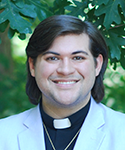Almost every church person I know has been overextended at one time or another, taking on far more than they can handle. We used to call it “having too much on your plate.” But just as individuals can overextend themselves, so too can congregations. My own church, St. Cyprian’s Episcopal Church in Oxford, North Carolina, is a perfect example.
Historically a black Episcopal church, St. Cyprian’s is now a solidly multicultural congregation composed primarily of African-American and Hispanic/Latino members. Our town, Oxford, has great needs but also a group of people who are passionate about their community’s well-being. If they overextend themselves at times, whether as individuals or entire churches, it’s because they believe that Oxford’s future, in this generation and the next, hinges on their ability to do good right now.
For several years, St. Cyprian’s has offered a free after-school literacy program for children from low-income homes throughout the area whose reading skills are at least two years below grade level. Although very effective and much loved, the literacy program was struggling when I arrived as vicar about two years ago. Despite its popularity, the project was overextending the congregation’s resources and coasting on financial fumes. Without a significant infusion of funds, it would have to close.
But the program’s failure would cause much more harm than just embarrassment for St. Cyprian’s (and its young new priest with something to prove). It would cause real damage in the community by eliminating a much-needed service that was helping at-risk children.
Determined to save the program, we scoured the church budget for available funds but didn’t find much there to help. We brainstormed various fundraising proposals and other revenue ideas but were stymied there as well. We could fry every catfish in North Carolina for a fundraiser and still not raise enough to cover the program’s expenses. And charging a fee large enough to cover our costs would exclude the population of children we wanted to serve. Surely even wise King Solomon would have been stumped; we certainly were.
Exhausted, we turned to the church’s proven go-to strategy for problem solving: we formed an advisory committee. To ensure a wide range of input, the church decided to include community members on the committee. One parishioner suggested asking the mayor whether she or anyone she knew might be interested in serving.
Understandably, some members were hesitant to reach out to people and organizations beyond St. Cyprian’s. We didn’t want potential partners to think they were being asked to endorse more than just the church’s literacy program. And some members had the same fear that often comes with reaching out -- the fear of rejection (which in our case would have been even more humiliating when soon followed by our very public failure). With all of that churning in my stomach, I gave the mayor a call.
I had met her shortly after I started at St. Cyprian’s in 2015, when I was making my rounds in the community. Like everyone else I met, she welcomed me and told me to let her know what she could do to help as I settled in. Although I appreciated the sentiment, I dismissed her offer as one of the ritual niceties that are still part of daily life in small Southern towns. Being a good Southerner myself, I was later surprised to find myself taking her up on her offer.
To my amazement, the mayor was excited that she might be of some help. Although she politely declined the invitation to sit on the program’s board, she offered another -- and better -- idea. She suggested that the church form a partnership with the local office of the Boys & Girls Clubs of North Central North Carolina, and she connected me with the director.
Nobody at St. Cyprian’s liked the idea of giving up our autonomy in the program, but we were out of options. It was this or nothing, so off I went to talk with the club director. When I met with him, he was impressed with our program and its effectiveness and immediately agreed to join with us to keep it going. Now in its second year, the partnership has been a godsend. The literacy program isn’t just viable now; it is thriving, having expanded to serve twice as many children as before.
St. Cyprian’s desire to serve the community was laudable. But overextending ourselves in the process was a flawed strategy for sustaining God’s work. What we discovered was that the work we wanted to do in the community could be much more effective when done with the community and not just for it.
At St. Cyprian’s, we were trapped in the belief that we weren’t really leading unless we did our good works solely on our own. As a result, our church became overextended spiritually and financially. We risked losing the joy of service and becoming just another frustrated, disconnected voice crying out for change while sacrificing effectiveness for autonomy.
As St. Teresa of Avila and others taught, we are to be Christ’s hands and feet in the world. But even as we act as the Savior’s hands and feet, we must remember that we are not the Savior. We are called to be Christlike, not to take Christ’s place in the divine order of things. Trying to be the Savior overextended St. Cyprian’s and almost killed a life-changing program.
If we act as though the church is an island unto itself, we diminish both ourselves and others. If we believe in the illusion of total self-sufficiency and neglect opportunities to create meaningful partnerships, we will never truly engage with the community. At St. Cyprian’s, we’ve learned that extending Christ’s hands to the world doesn’t mean overextending ourselves. Sometimes it means reaching out and asking how the community can help us serve.



















